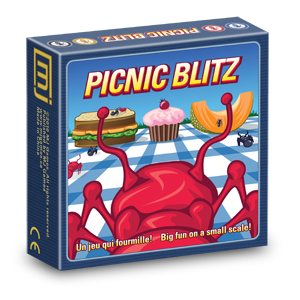Picnic Blitz is a dice game that I released shortly after Insidious Sevens. Like Insidious Sevens, it was loosely inspired by several classic dice games, such as Yahtzee and Nada, both of which my friends played a lot of in our university days, and Sid Sackson’s Can’t Stop, which proved that a game can be mostly about rolling dice, yet still have a significant skill component.
Players control teams of six ants, one for each of the six tracks on the board, which in turn correspond to the six numbers on a standard die. At the end of each track is a food item, worth from 2 to 4 points depending on the length of the track. When an ant reaches a food item, the points are awarded to that player, and no other ants can progress on that track; however, the ant may be dethroned by the other players, in which case the player loses the points and the food is back up for grabs. The number of points needed to win depends on the number of players, but it can be very tricky to hang on to enough different food items simultaneously to reach that goal.
The basic gameplay consists of rolling the dice, then rerolling some or all of them Yahtzee-style, to try to get either lots of a single number corresponding to a useful track, or straights which can be used to attack the opponents. Additional player interaction is provided by the fact that landing directly on top of an opponent’s ant pins it, rendering it unable to move until either the pinning ant moves voluntarily, or is knocked off by an attack.
The next strategic element of the game comes in how many rerolls are permitted. Rather than being allowed to reroll any number of dice, as in Yahtzee, players are allowed to reroll only as many as they have ants on the board, not counting those who are pinned, those that have not yet moved onto the board, or those on tracks where another player has already claimed the food. Thus, early strategy revolves around whether to plunge forwards for one specific food item, or spread oneself out to earn additional rerolls.
Finally, I decided to cut down on the late game luck factor through the introduction of Queen tokens. When a player is dissatisfied with their roll, they may skip their turn to take one of these tokens, which can later be used in one of three ways – for an extra reroll, for an extra attack, or to move two ants with a single roll. This option lessens the sting of bad luck, and keeping a Queen token for the right moment helps make the final push to win that much easier.
Despite the game’s name, the endgame is often a more protracted struggle than a mad dash. Food items will often trade hands repeatedly, as a player who can’t quite get the roll he needs to win will often seek to roll a straight instead and make it harder for the next player to win. The level of interaction also makes it easier for trailing players to cooperate against a likely winner, so the outcome of the game is often very close.
